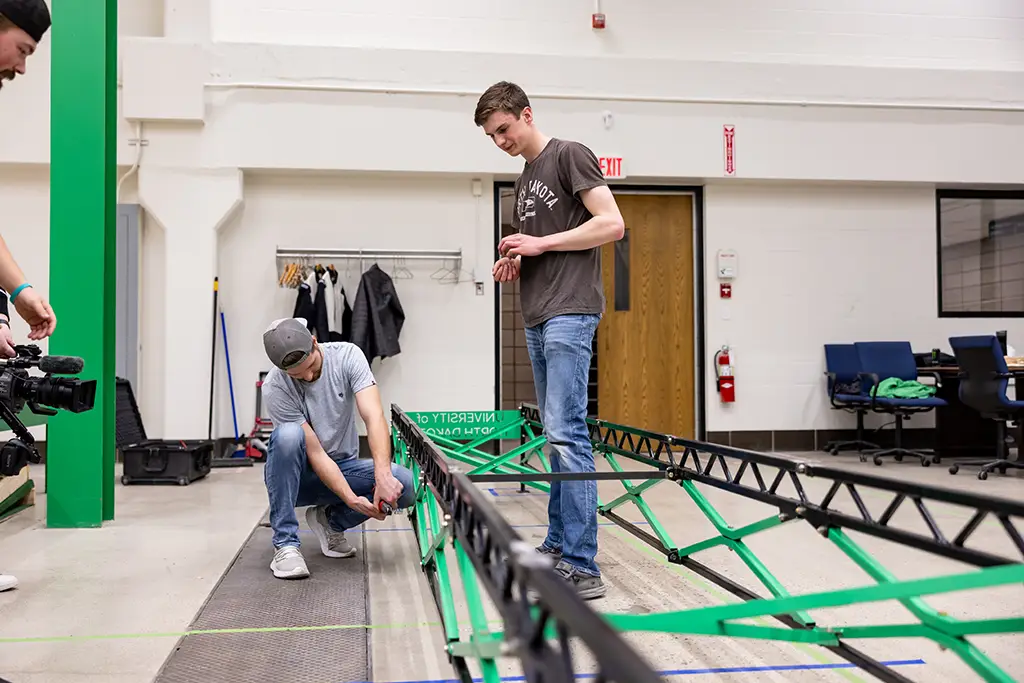
Easiest Engineering Degree Options to Consider Today
Engineering often comes with a reputation for being one of the toughest academic paths out there.
Request Information
Long nights of studying, complex equations, and packed schedules can make it feel overwhelming. However, the truth is that not all engineering majors are created equal in terms of workload and difficulty.
Some paths are more approachable, offering a smoother journey for students who want to enter the field without feeling completely burned out. If you’re exploring your options and wondering where to begin, this guide will walk you through some of the easiest engineering degree choices that lead to rewarding and impactful careers.
Key Takeaways
- Not all engineering degrees are equally demanding. Some fields, such as industrial or environmental engineering, may feel more approachable depending on your strengths and learning style.
- Choosing the right major involves considering curriculum structure, job outlook, work environment, accreditation, and hands-on learning opportunities.
- With the right resources, time management, and support systems, students can succeed in any engineering path, especially through programs like those offered at UND.
Easiest Engineering Degrees
The idea of the “easiest engineering degree” can vary from person to person. It often depends on individual strengths, interests, and preferred learning styles. Then again, some majors involve less intense math, fewer lab hours, or more practical coursework.
Below, you'll find a list of engineering degrees that many students find more approachable to pursue, and why.
1. Environmental Engineering
Environmental engineering combines chemistry, biology, and civil engineering to design solutions for clean water, pollution control, and waste management. It can feel accessible thanks to its practical focus and lab-based coursework.
Students at the University of North Dakota (UND) pursue a graduate certificate in environmental engineering or M.S./Ph.D. through the civil engineering department, engaging in interdisciplinary research involving soil, water, and environmental systems.
Core courses cover hydrology, pollution prevention, and remediation. Graduates often become environmental consultants, water resources engineers, or sustainability specialists, working in government, nonprofit organizations, or the private sector.

2. Civil Engineering
Civil engineering focuses on planning, designing, building, and maintaining infrastructure such as roads, bridges, and water systems. Students often find the blend of theory and design to be more manageable. UND’s ABET‑accredited B.S. in Civil Engineering, M.S./M.Eng., and Ph.D. programs offer mentoring, design projects, and internship opportunities, with core courses including structural analysis, transportation engineering, and water resources. Graduates work as structural engineers, project managers, or urban planners for local governments, consulting firms, or construction companies.

3. Geological Engineering
This degree combines geology and engineering to address earth-related challenges such as slope stability, groundwater flow, and resource exploration. It’s accessible due to its mix of fieldwork and geoscience, reducing abstract theoretical load. Graduates often enter roles as geotechnical engineers, hydrologists, or environmental geologists with consulting firms or government agencies.
The ABET‑accredited Geological Engineering B.S. degree at UND, along with M.S. and Ph.D. degrees, provide hands-on field studies, lab analysis, and environmental focus. Common courses include geotechnical engineering, hydrogeology, and mineral resource exploration.
4. Industrial Engineering
This field centers on optimizing people, processes, and systems for efficiency. It’s often more approachable because it emphasizes applied problem-solving, human factors, and workflow improvements instead of abstract math. Common coursework includes operations research, ergonomics, supply chain management, and quality control.
Graduates typically become process engineers, supply‑chain analysts, or systems coordinators in manufacturing, healthcare, or logistics. The work tends to be structured, collaborative, and results‑oriented, making the learning journey feel more intuitive and less overwhelming as you see real progress from day one.
5. Architectural Engineering
Architectural engineering merges structural, HVAC, lighting, and acoustical engineering within building design. It’s often intuitive because it integrates engineering principles directly into real-life structures. The blend of technical and aesthetic elements helps many students stay engaged and see immediate results.
Structural design, building systems, and sustainable design are some of the typical courses covered in this program. Graduates become building systems engineers, construction consultants, or sustainability coordinators, working with builders or architecture firms.

6. Systems Engineering
Systems engineering involves designing, integrating, and managing complex systems across aerospace, defense, transportation, and IT. It is approachable because it focuses on high-level coordination, requirements analysis, and project management instead of intense computation.
Courses include systems modeling, risk analysis, and systems architecture. With this degree, students can choose to become systems engineers, project managers, or integration specialists, working in industries like aerospace, defense, software, or manufacturing. All these roles often involve communication and leadership rather than pure technical depth.
At UND, you can pursue a 1-year systems engineering certificate for new opportunities as a drone engineer, UAV designer, and systems engineer. Or, you may choose to transfer the credits earned into an M.S. or M.Eng. in Systems Engineering.
7. Agricultural Engineering
Agricultural engineering applies engineering to farming systems, covering irrigation, machinery, and environmental control. It’s often considered easier because its practical, context-rich nature helps many students feel more engaged and capable.
Core coursework includes soil mechanics, farm machinery design, and drainage systems. Graduates work as agricultural systems engineers, equipment designers, or environmental control specialists in food production, agribusiness, or resource management sectors. This degree often includes hands-on labs and fieldwork.

8. Mechanical Engineering
Mechanical engineering emphasizes the design, construction, and testing of mechanical systems, including engines, HVAC systems, and robotics. It’s mostly seen as accessible due to its hands-on labs and project-based learning. At UND, students in the B.S. in Mechanical Engineering as well as, M.S./M.Eng., and Ph.D. programs gain experience with wind tunnels, nanotech, aerospace hardware, and cooperative education through internships.
Courses cover thermodynamics, materials science, and machine design, while successful graduates become design engineers, mechanical project leaders, or enter the automotive, aerospace, and defense industries.
9. Safety Engineering
Focused on hazard identification, risk reduction, and compliance in industrial settings, safety engineering is often more approachable due to its applied, safety-first perspective. Courses cover risk analysis, safety regulations, human factors, and systems safety.
Graduates work as safety engineers, occupational health specialists, or compliance officers in industries like manufacturing, oil and gas, construction, or healthcare, ensuring safe working environments and regulatory adherence.

10. Petroleum Engineering
This field involves extracting and producing oil and gas through applied chemistry, geology, and engineering. Many students find it easier because it focuses on real-world challenges rather than abstract theory.
UND offers the only petroleum engineering program in the state, with hands-on labs like drilling simulators, virtual reality, and Bakken‑specific fieldwork. Core classes include reservoir engineering, drilling systems, and production optimization. Graduates usually work as reservoir, drilling, or production engineers in the energy sector.
What to Consider When Choosing an Engineering Major
Choosing the right engineering major is a personal decision, but thoughtful planning and research can make all the difference in shaping a meaningful and successful career path. So, before choosing a major, take the time to reflect on your strengths, interests, and long-term goals.
Do you enjoy hands-on problem-solving or data analysis? Are you drawn to environmental issues, infrastructure, or emerging technologies? Aligning your choice with what you naturally enjoy can lead to greater success and job satisfaction.
Look closely at the curriculum structure of each major. Some fields are more math-intensive, while others focus more on systems or fieldwork. Consider industry demand, projected job growth, and average salaries to ensure your degree supports a stable and rewarding career. Work environment also matters, as some engineers work in labs or offices, while others spend more time outdoors or on-site.
Accreditation is another key factor. Choosing a program accredited by ABET ensures quality education and helps with licensing and job opportunities. At UND, most engineering programs hold ABET accreditation and offer hands-on experience through labs, senior design projects, and fieldwork. Students also benefit from internship and cooperative education programs with industry partners, helping them build real-world experience before graduation.
Tips and Resources to Succeed in Any Engineering Major
Engineering programs can be challenging, but with the right mindset and habits, you can stay ahead and thrive. Here are some practical tips to help you make the most of your experience, no matter which engineering path you choose:
- Master time management: Use planners or digital calendars to track assignments, exams, and project deadlines. Prioritize tasks daily.
- Form or join study groups: Learning with others helps you understand complex concepts and stay motivated. UND Housing has a Living Learning Community for engineering students who want to live and study together.
- Use campus tutoring services: Don’t wait until you're struggling. Many schools offer free help in math, physics, and engineering courses. UND's Math Active Learning Lab is a great example of specialized math tutoring free to students.
- Attend professor office hours: These sessions offer personalized help and can lead to mentorship or research opportunities.
- Stay organized: Keep your notes, lab reports, and assignments well-structured. It saves time and lowers stress.
- Get involved in engineering clubs: At UND, groups like the Society of Women Engineers and American Society of Mechanical Engineers (ASME) help you meet peers and grow professionally.
- Explore professional organizations: Joining groups like ASME, IEEE, or NSBE can connect you to mentors, internships, and conferences.
Conclusion
While engineering can be demanding, not all majors are equally intense. Some paths may feel more accessible based on how they align with your strengths, interests, and career goals. The “easiest engineering degree” truly depends on what feels natural and rewarding to you.
As you explore your options, consider what excites you, the environment in which you see yourself thriving, and where you want to make a meaningful impact.
With thoughtful planning and the proper support, you can turn any engineering major into a meaningful journey. If you’re ready to take the next step, the programs and opportunities at UND are a great place to begin.
FAQs
Industrial engineering is often considered one of the easier roles due to its focus on systems optimization and less intensive math compared to other fields.
Electrical engineering is widely seen as one of the toughest due to its heavy focus on advanced mathematics, physics, and abstract concepts. But again, it varies based on who you ask. Some electrical engineers would say chemical engineering is the most difficult.
Yes, most universities allow students to change majors, especially within engineering, though it may require catching up on specific courses.